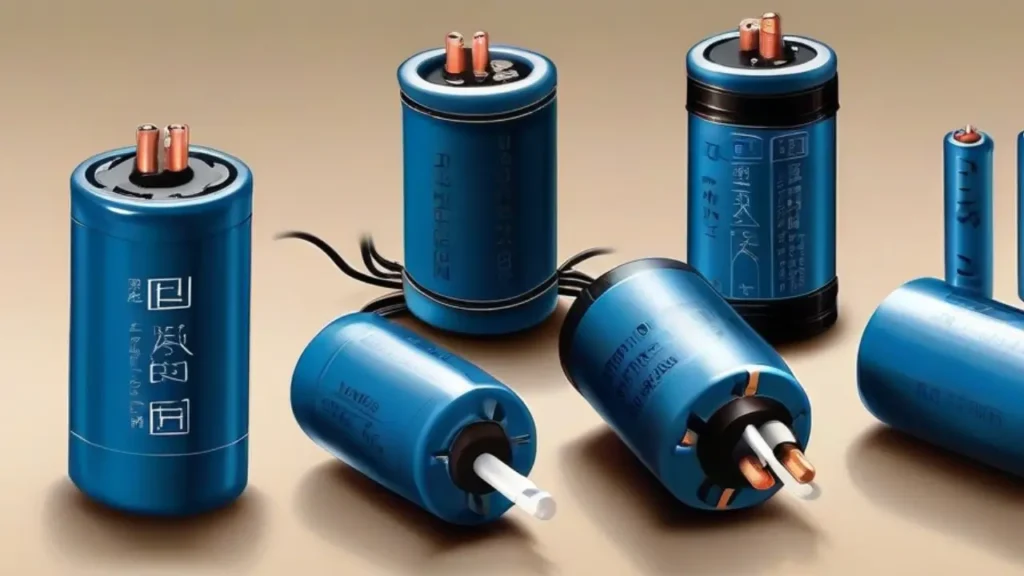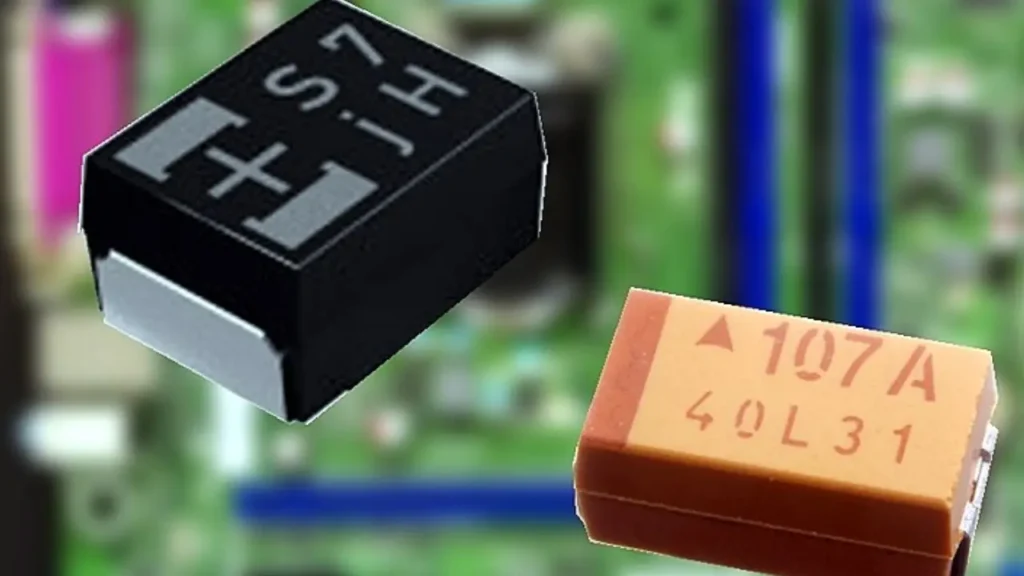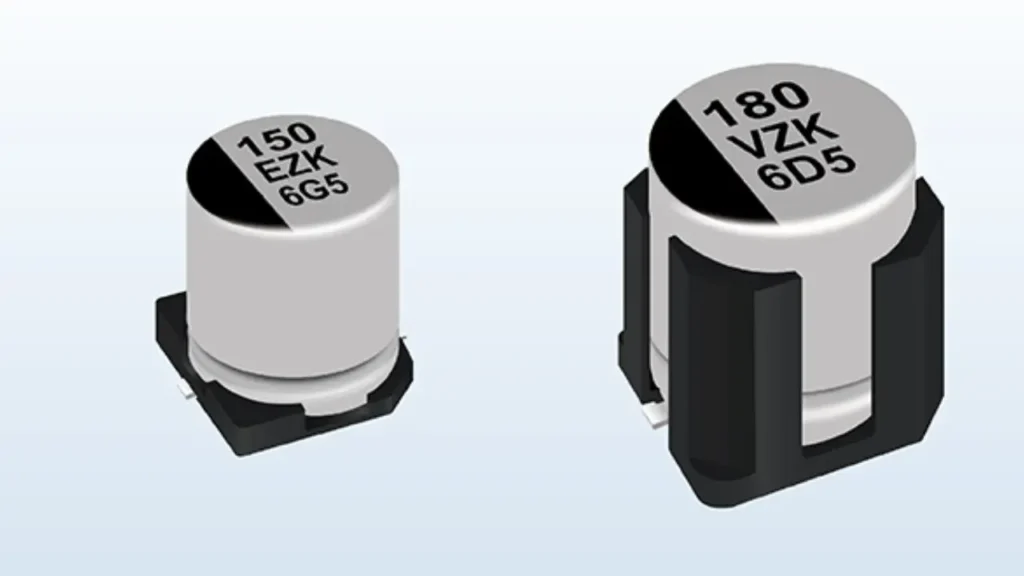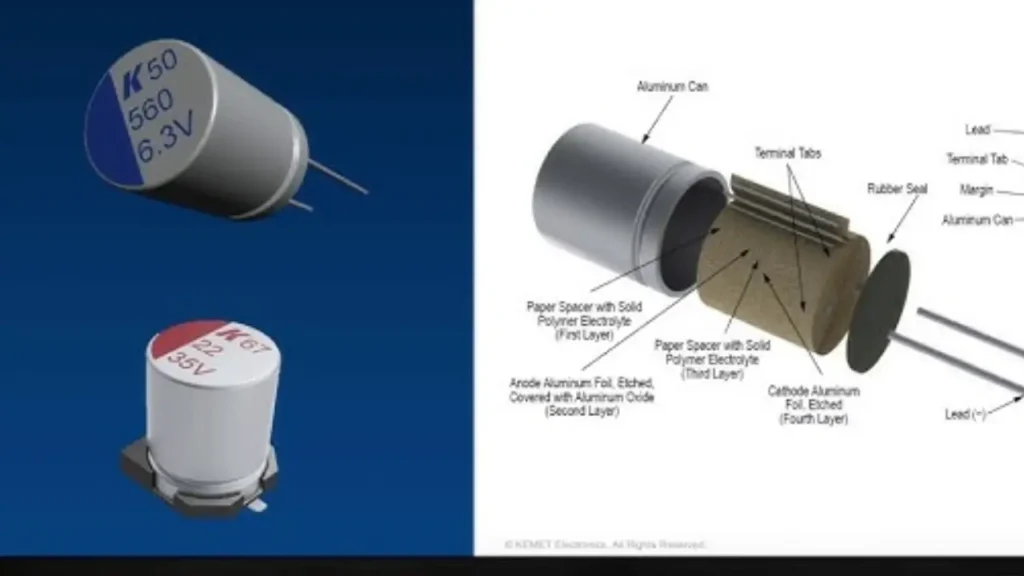Are you confused about the differences between electrolytic and polymer capacitors?
In the realm of electronics, capacitors are essential components that store and release electrical energy. While both electrolytic and polymer capacitors serve similar purposes, they have distinct characteristics and applications.
In this blog post, we’ll delve into the key differences between these two capacitor types, exploring their construction, performance, and ideal use cases. By understanding these distinctions, you can make informed decisions when designing your electronic circuits.
What Is Electrolytic Capacitor

An electrolytic capacitor is a type of capacitor that uses an electrolyte to achieve a larger capacitance than other capacitor types. An electrolyte is a liquid or gel containing a high concentration of ions.
Key features:
- Large capacitance: Electrolytic capacitors can store large amounts of energy in a relatively small package.
- Polarized: They must be connected with the correct polarity to avoid damage.
- Lower voltage rating: Compared to other capacitor types, electrolytic capacitors typically have lower voltage ratings.
- Higher leakage current: They have higher leakage current compared to other capacitor types.
Common applications:
- Power supplies: Used for filtering and smoothing DC power supplies.
- Audio amplifiers: Used for coupling between amplifier stages.
- Timing circuits: Used in oscillators and timers.
Types of electrolytic capacitors:
- Aluminum electrolytic capacitors: The most common type, using aluminum oxide as the dielectric.
- Tantalum electrolytic capacitors: Offer higher capacitance and lower leakage current than aluminum electrolytic capacitors.
- Niobium electrolytic capacitors: Similar to tantalum capacitors, but with improved performance and reliability.
Important considerations:
- Polarity: Always connect electrolytic capacitors with the correct polarity to avoid damage.
- Voltage rating: Do not exceed the voltage rating of the capacitor.
- Temperature: High temperatures can reduce the lifespan of electrolytic capacitors.
- Ripple current: Exceeding the ripple current rating can lead to overheating and reduced lifespan.
What Is a Polymer Capacitor

A polymer capacitor, also known as a polymer electrolytic capacitor, is a type of capacitor that uses a solid polymer electrolyte instead of a liquid electrolyte. This design offers several advantages over traditional electrolytic capacitors:
Key features:
- Low ESR: Low Equivalent Series Resistance, which means they can handle high frequencies and high ripple currents efficiently.
- High ripple current handling: They can handle large fluctuations in current without overheating.
- Long lifespan: The solid polymer electrolyte is more stable and less prone to degradation, leading to a longer lifespan.
- Compact size: Polymer capacitors are often smaller than traditional electrolytic capacitors.
- Improved safety: The solid electrolyte reduces the risk of electrolyte leakage.
Common applications:
- Power supplies: Used for filtering and smoothing DC power supplies in various electronic devices.
- Automotive electronics: Used in engine control units, infotainment systems, and other automotive applications.
- Consumer electronics: Used in smartphones, tablets, laptops, and other consumer devices.
- Industrial electronics: Used in power electronics, motor drives, and other industrial applications.
Types of polymer capacitors:
- Polymer tantalum capacitors: Use tantalum oxide as the dielectric and a solid polymer electrolyte.
- Polymer aluminum capacitors: Use aluminum oxide as the dielectric and a solid polymer electrolyte.
Important considerations:
- Polarity: Polymer capacitors are polarized, so they must be connected with the correct polarity to avoid damage.
- Voltage rating: Do not exceed the voltage rating of the capacitor.
- Temperature: High temperatures can reduce the lifespan of polymer capacitors.
- Ripple current: Exceeding the ripple current rating can lead to overheating and reduced lifespan.
Electrolytic vs Polymer Capacitor

Electrolytic Capacitors
Electrolytic capacitors are a type of capacitor that uses a liquid electrolyte to increase capacitance. They are known for their high capacitance values in a small package, making them ideal for many applications. However, they have limitations, such as lower voltage ratings, higher leakage current, and shorter lifespan compared to other capacitor types.
Polymer Capacitors
Polymer capacitors, also known as solid-state electrolytic capacitors, utilize a solid polymer electrolyte instead of a liquid one. This design offers several advantages over traditional electrolytic capacitors:
- Lower ESR: This results in improved power efficiency and reduced heat dissipation.
- Higher Ripple Current Handling: They can handle larger fluctuations in current, making them suitable for demanding applications.
- Longer Lifespan: They have a longer lifespan due to the solid polymer electrolyte.
- Smaller Size: They often have a smaller physical footprint.
- Improved Safety: The solid electrolyte reduces the risk of electrolyte leakage.
Polymer vs electrolytic capacitor comparison table
| Feature | Electrolytic Capacitor | Polymer Capacitor |
|---|---|---|
| Electrolyte | Liquid | Solid Polymer |
| ESR | Higher | Lower |
| Ripple Current Handling | Lower | Higher |
| Lifespan | Shorter | Longer |
| Size | Larger | Smaller |
| Cost | Lower | Higher |
While electrolytic capacitors are a cost-effective solution for many general-purpose applications, polymer capacitors offer superior performance in terms of ESR, ripple current handling, and lifespan. They are ideal for high-frequency, high-ripple current applications, such as power supplies, automotive electronics, and consumer electronics.
Need high-quality capacitors for your next project? Contact us today to explore our wide range of polymer and electrolytic capacitors. Our expert team can help you find the perfect solution for your specific needs.
Replace Electrolytic Capacitor With Polymer
Replacing electrolytic capacitors with polymer can offer significant advantages in certain electronic circuits.
Electrolytic Capacitors:
- Traditional Type: Utilize a liquid electrolyte, often with a limited lifespan due to the gradual drying out of the electrolyte.
- Pros: High capacitance in small packages, relatively inexpensive.
- Cons:
- Limited lifespan (due to electrolyte drying)
- Higher Equivalent Series Resistance (ESR)
- Can exhibit higher leakage current
- Potential for electrolyte leakage
Polymer Capacitors:
- Solid Polymer Electrolyte: Use a solid polymer instead of a liquid, eliminating the drying out issue.
- Pros:
- Longer lifespan
- Significantly lower ESR
- Lower leakage current
- Improved high-frequency performance
- Cons:
- Generally more expensive than traditional electrolytics
When to Consider Replacement:
- Lifespan Issues: If you’re experiencing problems with a device that likely uses electrolytic capacitors (e.g., old audio equipment, power supplies), replacing them with polymers can extend the device’s lifespan.
- Performance Improvements: In applications where low ESR is critical (e.g., audio amplifiers, power supplies with high ripple currents), polymer capacitors can significantly improve performance.
- Reduced Heat: Lower ESR leads to less heat generation, improving overall system efficiency and reliability.
Important Considerations:
- Voltage Rating: Ensure the replacement polymer capacitor has a voltage rating equal to or greater than the original electrolytic.
- Polarity: Electrolytic capacitors are polarized; ensure the polarity of the replacement is correct to avoid damage.
- Physical Size: Polymer capacitors may have different physical dimensions than the originals.
- Cost: Polymer capacitors are generally more expensive than traditional electrolytics.
Replacing electrolytic capacitors with polymer capacitors can be a worthwhile upgrade in many cases, offering improved lifespan, performance, and reliability.16 However, careful consideration of the specific application and component selection is crucial to ensure proper operation.
Solid Polymer Capacitor vs Electrolytic
Electrolytic Capacitors
- Electrolyte: Liquid electrolyte
- ESR: Higher ESR
- Ripple Current Handling: Lower ripple current handling
- Lifespan: Shorter lifespan
- Size: Larger size
- Cost: Lower cost
- Applications: General-purpose applications like power supplies, audio amplifiers, and timing circuits.
Solid Polymer Capacitors
- Electrolyte: Solid polymer electrolyte
- ESR: Lower ESR
- Ripple Current Handling: Higher ripple current handling
- Lifespan: Longer lifespan
- Size: Smaller size
- Cost: Higher cost
- Applications: High-frequency, high-ripple current applications like power supplies, automotive electronics, and consumer electronics.
Key Differences
| Feature | Electrolytic Capacitor | Solid Polymer Capacitor |
|---|---|---|
| Electrolyte | Liquid | Solid Polymer |
| ESR | Higher | Lower |
| Ripple Current Handling | Lower | Higher |
| Lifespan | Shorter | Longer |
| Size | Larger | Smaller |
| Cost | Lower | Higher |
While electrolytic capacitors are a cost-effective solution for many general-purpose applications, polymer capacitors offer superior performance in terms of ESR, ripple current handling, and lifespan. They are ideal for high-frequency, high-ripple current applications, making them a popular choice for modern electronic devices.
Aluminum Electrolytic vs Polymer Capacitors

Aluminum Electrolytic Capacitors
Aluminum electrolytic capacitors are a common type of capacitor that uses a liquid electrolyte to increase capacitance. They are known for their high capacitance values in a small package, making them ideal for many applications. However, they have limitations, such as lower voltage ratings, higher leakage current, and shorter lifespan compared to other capacitor types.
Key Features:
- High capacitance in a small package
- Lower voltage ratings
- Higher leakage current
- Shorter lifespan
- Lower cost
Polymer Capacitors
Polymer capacitors, also known as solid-state electrolytic capacitors, utilize a solid polymer electrolyte instead of a liquid one. This design offers several advantages over traditional electrolytic capacitors:
- Lower ESR: This results in improved power efficiency and reduced heat dissipation.
- Higher Ripple Current Handling: They can handle larger fluctuations in current, making them suitable for demanding applications.
- Longer Lifespan: They have a longer lifespan due to the solid polymer electrolyte.
- Smaller Size: They often have a smaller physical footprint.
- Improved Safety: The solid electrolyte reduces the risk of electrolyte leakage.
Key Features:
- Lower ESR
- Higher ripple current handling
- Longer lifespan
- Smaller size
- Improved safety
- Higher cost
| Feature | Aluminum Electrolytic Capacitor | Polymer Capacitor |
|---|---|---|
| Electrolyte | Liquid | Solid Polymer |
| ESR | Higher | Lower |
| Ripple Current Handling | Lower | Higher |
| Lifespan | Shorter | Longer |
| Size | Larger | Smaller |
| Cost | Lower | Higher |
While aluminum electrolytic capacitors are a cost-effective solution for many general-purpose applications, polymer capacitors offer superior performance in terms of ESR, ripple current handling, and lifespan. They are ideal for high-frequency, high-ripple current applications, making them a popular choice for modern electronic devices.
Electrolytic vs Film Capacitors
Electrolytic Capacitors
Electrolytic capacitors are a type of capacitor that uses an electrolyte to increase capacitance. They are known for their high capacitance values in a small package, making them ideal for many applications. However, they have limitations, such as lower voltage ratings, higher leakage current, and shorter lifespan compared to other capacitor types.
Key Features:
- High capacitance in a small package
- Lower voltage ratings
- Higher leakage current
- Shorter lifespan
- Lower cost
- Polarized (must be connected with correct polarity)
Common Applications:
- Power supplies
- Audio amplifiers
- Timing circuits
Film Capacitors
Film capacitors use a thin film of dielectric material, such as polypropylene, polyester, or ceramic, to store energy. They offer several advantages over electrolytic capacitors, including higher voltage ratings, lower leakage current, and longer lifespan.
Key Features:
- Higher voltage ratings
- Lower leakage current
- Longer lifespan
- Non-polarized (can be connected in any orientation)
- Wider range of capacitance values
- Higher cost
Common Applications:
- Timing circuits
- Filtering circuits
- Coupling circuits
Comparison Table
| Feature | Electrolytic Capacitor | Film Capacitor |
|---|---|---|
| Electrolyte | Liquid | Solid Dielectric Film |
| ESR | Higher | Lower |
| Ripple Current Handling | Lower | Higher |
| Lifespan | Shorter | Longer |
| Voltage Rating | Lower | Higher |
| Polarity | Polarized | Non-Polarized |
| Cost | Lower | Higher |
While electrolytic capacitors are a cost-effective solution for many general-purpose applications, film capacitors offer superior performance in terms of voltage rating, leakage current, and lifespan. They are ideal for high-frequency, high-voltage applications, making them a popular choice for many electronic devices.
The choice between electrolytic and film capacitors depends on the specific requirements of the application, such as capacitance value, voltage rating, leakage current, and cost.
Conclusion
In conclusion, both electrolytic and polymer capacitors play crucial roles in electronic circuits, each with its unique strengths and weaknesses. While electrolytic capacitors offer a cost-effective solution for many general-purpose applications, polymer capacitors excel in high-frequency, high-ripple current environments.
By understanding the differences between these two capacitor types, engineers and designers can make informed decisions to optimize their circuit designs.
Ready to elevate your electronic designs? Explore our wide range of high-quality capacitors, including polymer capacitors, to meet your specific needs. Contact us today to discuss your project requirements and receive expert advice.